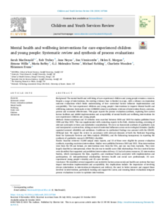Demographic Data
|
Sources: World Bank, UNICEF, UNDP HDR 2015, DHS 2013 |
Displaying 701 - 710 of 14551
During this webinar, participants explored the role of the Catholic Church in the separation of Indigenous children from their families and the long-lasting effect on Indigenous communities.
The purpose of this review was to describe in more detail the findings and range of research undertaken regarding the reintegration of children out of family-based care situations, thereby providing a mechanism for summarizing and disseminating research findings to policy makers, practitioners, and researchers who might otherwise lack time or resources to undertake such works themselves. The review has been undertaken with the motive of answering the question
of what is known from the existing empirical literature about the effectiveness and challenges of intervention programs that are meant to sustainably reintegrate children out of family-based care?
This scoping review aimed to identify the factors affecting the effectiveness of reintegration interventions targeting children outside family-based care. It aims to provide service providers with concise evidence regarding the situations affecting the effectiveness of reintegrating vulnerable children into the community by reviewing the relevant empirical evidence. Unlike other related reviews that have dealt with reintegration practices in selected regions or a specific country alone the present study considered research undertaken in all regions of the world.
-
Time: 1:00 p.m. to 2:30 p.m. EST
This global systematic review incorporated a comprehensive search of available literature from 1990 and captures the extant literature relating to process evaluations for interventions which address care-experienced children and young people’s mental health and well-being, and is one of the first syntheses of process evaluations in social care.
This report is the Commission’s first annual enlargement report on Ukraine replacing the previous annual Association Implementation Reports. To complement its opinion on the membership application, the Commission published the analytical report on the acquis alignment of Ukraine in February 2023.
On November 8th at 2:00 pm CET, the Alliance will host a global launch of the revised CPHA Competency Framework and the available tools to support its use by individual practitioners, teams and organisations.
The United Nations secretary general, António Guterres, has warned that the Gaza Strip is becoming “a graveyard for children” as he called again for an immediate humanitarian ceasefire to allow aid into the embattled territory.
Changing the Way We Care (CTWWC) promotes safe, nurturing family care for children reintegrating from residential care facilities (often referred to as “orphanages”) and prevents child-family separation by strengthening families, reforming national systems of care for children, and working to shift donor and volunteer support away from residential care and toward family care alternatives.





